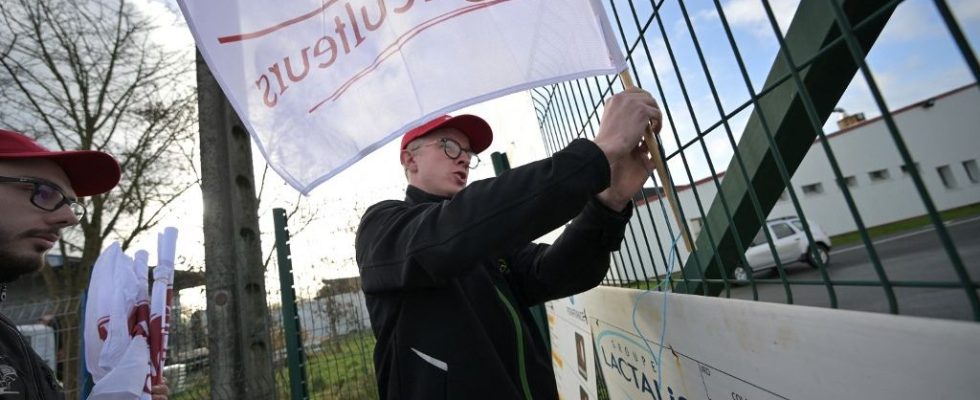The actions of farmers in front of Lactalis group factories are widely followed on social networks, notably that of January 23 in Haute-Saône. There departmental federation of farmers’ unions wanted to denounce “the refusal for months” of the world leader in milk “to negotiate with dairy farmers despite legal obligations, and pays 15% below its competitors for milk,” she denounced on X. L The action was relayed by France Bleu Besançon who filmed the dumping of manure and waste in front of the doors of Lactalis in Loulans-Verchamp.
These are the images which were then relayed on social networks, accompanied by inaccurate statements and which deserve to be put into context. On X, the French account of The Epoch Time, ranked in 2022 at the top of the sites relaying the most misinformation in France, notably maintained that Lactalis “has just lowered the purchase price of milk to 405 euros for 1,000 liters, which is less than the production cost for breeders of 450 euros”. An assertion then repeated in other viral posts, mentioning France Bleu as a source, which has followed these actions in several regions since January 18.
A decision dating from January 3
If this price of 405 euros per 1,000 liters is indeed the base price that Lactalis pays to breeders, it has not just been decided. Milk prices are the subject of negotiations between producers, generally grouped together in producer organizations, and the buyer. The Egalim law of 2019 has reversed the construction of this price: it is the producer who, normally, offers a selling price based on indicators of agricultural production costs. In the absence of an agreement on January 3, the price of milk paid in December was renewed in January by Lactalis. In November, the price of milk paid was 410 euros per 1,000 liters.
“405 euros was the December value that Lactalis wishes to renew, but without any justification other than reinforcing their margins at the expense of the producers”, deplores 20 minutes, Yohann Serreau, president of the National Union of Lactalis Livestock Breeders (Unell). This producer organization represents 5,300 farms, or 80% of the milk collected conventionally by Lactalis. The price of 405 euros corresponds to a global price which takes into account domestic and export markets.
A value “around 440 euros” for the Unell
“We are on a value of around 440 euros which would make it possible to promote the work of producers while respecting the market value,” continues the president of the dairy producers’ organization. Lactalis tells us that on average the total price paid to breeders is 435 euros. A price slightly higher than the base price due to the production of better quality milk and which is better remunerated, explains the president of Unell.
When discussions get stuck as is the case at the moment, the parties can appeal to the commercial and agricultural relations mediator. A first request from Lactalis on January 16 was refused by Unell, because its subject “did not refer to the Egalim laws”, which aims to protect the remuneration of farmers, indicates Yohann Serreau. A second request was submitted this time by Unell and accepted on January 22. This mediation opens this January 25.
Contacted, Lactalis indicates “fully respecting the provisions of the Egalim laws since their implementation” and wanting, with this mediation, to find “a satisfactory solution” to “valorize the work of producers, while offering consumers French dairy products at a reasonable price. affordable price. For Unell, it is about building a price that can give stability to producers while respecting Egalim laws.
Confusion between agricultural cost price and basic price
Another price is the subject of negotiations between Lactalis and Unell: that of the agricultural cost price, which corresponds to the selling price to cover expenses or even make a profit. This price is valid for the domestic market and not for export. And it was on price that there was confusion in an article from France Bleu Mayenne of January 10 and which could be interpreted as the fact that Lactalis had imposed “a drastic reduction” in prices on social networks.
It is written in conclusion that “as long as there is no agreement, producers sell milk for 405 euros, far from the desired 484 euros”. However, these two values “are difficult to compare”, explains Yohann Serreau. The first corresponds to the overall price (domestic + export), valid for export, and the second to the cost price on the domestic market, negotiated annually within the framework of the Egalim laws. In January, Lactalis pays 460 euros per 1,000 liters to producers on the domestic market, when Unell defends a cost price of 484 euros.
Producers demand a 5% increase
The group is proposing an increase of 5 euros, or 1%, indicating that it is relying on the usual negotiation method. For Lactalis, the request for a 5% increase in Unell is not “compatible with the deflation demands of large and medium-sized retail customers”. This proposal “fixed according to a methodology in place for four years, strictly respects the Egalim laws”, defends Lactalis.
Unell, for its part, supports an increase of 5% based on the increase in charges and the minimum wage. The two parties disagree on the method of calculating the cost price, the definition of which is part of the mediation. “Lactalis has the dunce cap for the whole of 2023 [en termes de prix proposé] and wishes to amplify this dunce behavior in 2024,” further denounces Yohann Serreau. Other actions to block Lactalis factories have taken place in recent days, such as in Dormont in Orne, in order to put pressure on the group.

